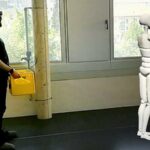I am working on a research protocol looking at manikin-based simulation vs. VR with our ACNP students. There are lots of „claims“ out there about what VR can and cannot do without much research to back it up. I have included my review for the protocol. I did something a little different and only included pre-appraised literature. Not to my surprise the literature is pretty poor and ambivalent on the effectiveness of VR as a teaching/learning tool. I know my review is not comprehensive. Send me good papers I am missing. I welcome your comments!
Note: I was tempted to have AI rewrite this but I resisted.
There is a general lack of quality research on the effectiveness of virtual reality versus traditional methods of instruction in nursing. Most of the studies are under powered, non-randomized and of general poor quality. There has been a number of systematic reviews and meta-analyses analyzing this literature. Foronda et al.(1) did a systematic review looking at the effectiveness of immersive VR versus manikin-based simulation. Fifteen studies met the inclusion criteria which included 11 RCTs. The outcomes that were examined varied. Eight studies showed no difference in outcomes, 4 studies favored traditional simulation, and 3 studies favored VR. The conclusion was that the authors could not support one method of simulation over another.
Chen et al,(2) did a meta-analysis of studies looking at VR vs standard simulation. Twelve studies were included. The authors concluded that VR did was better at improving skills, but not better at satisfaction, confidence or performance time. In another systematic review/meta-analysis by Huai (3), the authors start by stating there is limited research on the effectiveness of VR. Their research involved 26 studies that involved 1815 nursing students in total. The primary outcomes included: learning satisfaction, knowledge, and skill performance. Secondary outcomes included: self-efficacy, learning motivation, cognitive load, clinical reasoning, and communication ability. They found that immersive VR was effective in improving learning satisfaction, knowledge, skill performance and self-efficacy compared to traditional teaching methods. Virtual reality teaching had a similar effect as traditional teaching methods on student motivation, cognitive load, clinical reasoning, and communication.
In a systematic review by Liu(4), the authors analyzed 17 articles from 16 studies. These studies included a variety of healthcare students including nursing. The VR training included procedural training, anatomical knowledge, and orientation to the operating room. The majority of the studies (75%) were deemed poor quality by the authors. Although there was a tendency towards better outcomes in this review, the authors cautioned the interpretation due the low quality of the studies reviewed.
Finally, Choi et al.(5) did a systematic review looking at studies that used VR to assess learning, cognitive, and psychomotor performance. The review was composed of 9 studies between 2018 and 2020. Most of the participants in these studies preferred utilizing VR in their education. There were barriers associated with simulation sickness and lack of visual comfort.
As can be seen from this review, the literature supporting the use of VR is limited and not very good. The question is, does this mean VR is not an effective tool for nursing education, or do we just need more rigorous research? I think it is the later.
Quelle:
Foto: Taken by author at 2023 NTI


